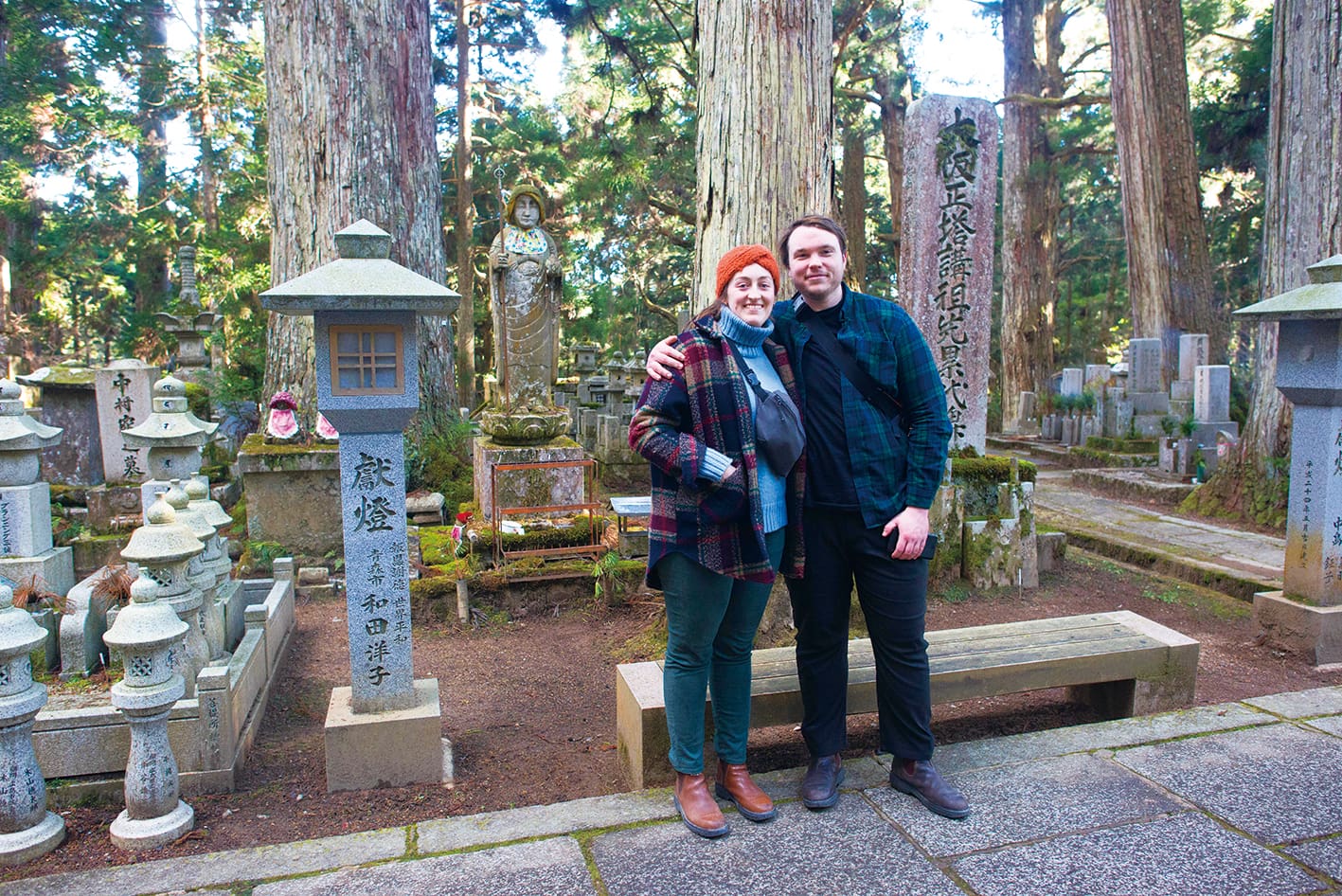The number of foreigners living in Japan continues to grow each year, and the stories behind their residencies are diverse. This article provides an overview of the ‘JET Programme,’ an international exchange program that invites foreign university graduates to work in local government roles across Japan. We also interviewed three Australians currently participating in the programme.
The Japan Exchange and Teaching Programme (JET Programme) aims to enhance foreign language education and promote international exchange at the local level, thereby fostering a mutual understanding between Japan and other countries, and advancing the internationalisation of Japanese regions.
Starting in 1987, the JET Programme is operated through a partnership between governmental bodies of Japan* and local governments. It invites young people around the world to Japan and provides them opportunities to teach languages, sports, etc., in elementary, junior-high and high schools in Japan, and to work in local governments and related organisations in order to promote international exchange in local communities. Currently, over 79,000 participants from 80 countries have participated in the programme, with approximately 1,000 local government bodies (contracting organisations), spanning 46 prefectures and 18 designated cities, hosting participants.
Participants in the JET Programme come to Japan through one of the following positions: Assistant Language Teacher (ALT), Coordinator for International Relations (CIR), or Sports Exchange Advisor (SEA).
The majority of ALTs are assigned to schools or boards of education, where they assist Japanese teachers in foreign language classes, prepare educational materials, and participate in extracurricular activities such as English study groups. Over 90% of JET Programme participants are ALTs. CIRs are typically assigned to the international exchange departments of local governments and engage in international exchange activities. Due to the nature of their work, applicants are required to have a high level of Japanese proficiency. SEAs are mainly assigned to local governments where they provide sports instruction. As experts in specific sports, they engage in international exchange activities by assisting in sports training methods and planning sports related projects.
The JET Programme offers Australians the opportunity to immerse themselves in Japanese culture, improve their Japanese language skills and gain valuable professional experience. By living and working in Japan, they can develop an understanding of the complexities and subtleties of Japanese society and build lifelong connections.
For information on how to apply to the JET Programme, visit the Embassy of Japan in Australia website
(https://www.au.emb-japan.go.jp/itpr_en/education_jet_en.html).
*Ministry of Foreign Affairs (MOFA), the Ministry of Internal Affairs and Communications (MIC), the Ministry of Education, Culture, Sports, Science and Technology (MEXT), and the Council of Local Authorities for International Relations (CLAIR) The number of foreigners living in Japan continues to grow each year, and the stories behind their residencies are diverse. This article provides an overview of the ‘JET Programme,’ an international exchange program that invites foreign university graduates to work in local government roles across Japan. We also interviewed three Australians currently participating in the programme.
Li-Cheng Yang ─ CIR in Kobe, Hyogo

Why did you join the JET Programme?
Like many people on the JET Programme, my first gateway to Japan was through anime and manga. I would watch anime on television and imagine what it would be like for me to live and work in Japan. Another reason why I decided to participate in the JET Programme is because of my Taiwanese-Australian background. As a first-generation immigrant to Australia at a young age, I have always had trouble fitting in and processing my own identity. Being in a multicultural country with a strong national identity, I always worried about whether or not I behaved and spoke like an “Australian.” I wanted to experience living in Japan, a country that is ethnically closer to my home country, to reaffirm who I am and where I belonged, and to understand what being Taiwanese-Australian means to me.
What are some of the specifics of your job?
As a CIR and Prefectural Advisor employed by the Kobe City Board of Education, I work in a small team with a few other foreigners in the Board of Education (BOE) office. We support the ALTs and spearhead ALTrelated initiatives and events hosted by the Kobe City BOE. Most of my duties revolve around working with the ALTs in Kobe City. A major portion of my workday would be spent answering emails from the ALTs, as well as conveying their messages/emails, translated from English to Japanese, to the ALT supervisors. I am also in charge of planning and executing ALT events hosted by the BOE, which requires me to communicate with other third-party organisations involved in the event. There are times when I am able to do more typical CIR-type work, such as organising cultural events and translating/interpreting. My experience on the JET Programme has been very enjoyable so far. I have had the opportunity to meet people in Japan from all over the world, and to challenge myself to improve myself. For example, since Kobe City has over 200 ALTs, it is difficult to support all of them with such a small team, and we often stay late in order to complete the work on time. However, these challenges provided me with just the right amount of motivation to improve my organisational and managerial skills. Work can still be stressful, and I often find it difficult to manage the workload, however I believe that the work I do has inherent value to it, and that the rewards I gain from overcoming each challenge are worth it.
What do you think has been the best thing about coming to Japan?
The best thing about coming to Japan on the JET Programme has definitely been the opportunity to immerse myself in Japanese culture and deepen my understanding of the country that is Japan. I was able to visit so many places with my friends that are not the usual famous spots, like Tokyo, Osaka, and Kyoto, that most tourists go to. I have visited places like the sand dunes in Tottori, Hoshioki Shrine in Sapporo, Kusatsu Onsen in Gunma, Kinosaki Onsen in Hyogo, and Matsushima in Miyagi Prefecture. After coming to Japan and having lived here for a little over two years, I feel a stronger sense of connection to the land here. When I travel to places such as the ones that I mentioned above, I feel that I am able to appreciate the history and the culture on a deeper level.
How are you enjoying your life in Japan?
Life in Japan has been amazing so far. I was able to visit onsens (hot springs), experience snow for the first time in my life, try on a kimono, hike up mountains, sing karaoke, and eat delicious foods with my friends, and I’ve gotten to meet some of the most important people in my life. In addition, I have found myself trying out more new things than I did before coming onto the JET Programme. Moving into a different environment really pushed me to be adventurous and try things that I never imagined myself doing back home. I never imagined that I would plan a spontaneous week-long trip to a different prefecture the night before, nor did I imagine I would try to talk to so many other people and learn about their lives throughout the course of my work. I am finding myself enjoying so many things that I did not think I would enjoy before. Japan and the JET Programme has truly been an unforgettable, lifechanging experience. I have learned so much more about Japan, about the world, and about myself. After the JET Programme, I would like to stay in Japan for longer and continue to use the knowledge and skills that I have gained throughout the JET Programme.

Miriam Barker-Lanzi ─ ALT in Osaka

Why did you join the JET Programme?
I joined the JET Programme because Japan holds a special place in my heart. I met my husband here when we were both travelling in 2018. After that trip, we both wanted to live in Japan, and with my experience as an English as a Foreign Language (EFL) teacher, it was actually my husband who suggested I apply for the program. I applied in 2019 and we were set to move to Okinawa in 2020 but the COVID-19 pandemic disrupted that plan! I reapplied in 2022, and we moved to Osaka in August 2023! The application process was quite extensive but worthwhile. It took time to write my essay regarding why I wanted to live and work in Japan, and gather all the required documents. Both my interviews, despite me being nervous, were actually really fun and allowed me to further express my desire to move to Japan. I’m extremely grateful to have been given the opportunity.
What has your experience on the JET Programme been like so far?
I work at a Junior High School (Australian equivalent: Years 7 to 9), in a small town, south of Osaka City. The school staff and students welcomed me into their community right away. They were curious to learn about me and where I was from. Day to day, I work alongside three English teachers to plan lessons and activities. I have two to four lessons per day, so when I’m not teaching, my time is filled with making teaching resources, marking student work, working on my English Board, playing sports, painting, cleaning, gardening, cooking, or practising my Japanese! My town’s fellow JET Programme members and I have also visited each other’s schools and local kindergartens. We host our own JET Matsuri ( festival) each year, which showcases the different countries we come from and offers a cultural exchange with the local community.
What do you think has been the best thing about coming to Japan?
I think as a tourist, I could only develop one perspective of Japan, a very transient one, as I was just passing through. So, living and working in Japan and becoming part of many communities here has allowed me to develop different perspectives of this beautiful, complex country and its culture. I feel a sense of belonging in the area where I live. Through my work, I have become part of my local school community, as well as the town’s wider education community. Fellow JETs have become friends I can ask advice from, hang out with, and share recipes and local recommendations with.
How are you enjoying your life in Japan?
My husband and I really love living here– the pace of life in our small town is slow and calm. I cycle to work every day along the river, past rice fields and little farms. We go to the beach often just to sit, relax, and watch the sunset. We have a traditional Japanese apartment with tatami floors so we’re enjoying the simplicity of minimalistic floor seating and futon beds. The kotatsu table in winter with friends and family is such a lovely experience! We enjoy watching the seasons come and go, each with their own natural beauty. There are so many things that living here allows us to see and discover that aren’t on the usual tourist travel itinerary. We have had some wonderful local trips and experiences and have more planned! Last year, my husband and I celebrated our five-year anniversary in the place where we first met—Koyasan, Wakayama Prefecture.
How will you make use of your JET Programme experience in the future?
While I am definitely not yet ready to leave Japan, looking to the future I want to return to Australia and become a qualified classroom teacher. My experience on the JET Programme has made me realise that this is what I want to do! I’ll be happy if I can share my experiences in Japan with my future students and encourage global mindsets within my classrooms. I would even love to establish ties between Australian and Japanese schools to help strengthen both Japanese and English language skills, as well as opening the minds of students to living and or travelling abroad. I’m an artist and I will forever be inspired by the natural beauty of Japan, as well as the amazing Japanese artists that I have discovered on my travels throughout the country. As an art teacher, I would like to share these with my future students too.

Geoffrey McIntyre ─ ALT in Osaka

Why did you join the JET Programme?
Japan has always been of interest to me, as it has been for so many people around the world. There are so many interesting things to see and do, and Japanese people seem to be really kind and friendly. My interest in Japan was sparked when I was young, from the anime I watched on Cheez TV every morning, my Japanese classes, and the Japanese exchange students I met in school. I remember my Japanese teacher was really friendly and always made me feel excited to learn Japanese. Although I unfortunately didn’t continue learning the language, the interest always remained. In early 2020, before the pandemic, I visited Osaka and I remember sitting in a park in the city and thinking about how much I would love to live here. I love anime, especially One Piece, I love the cool, small shops that are decorated with the owners’ favourite things, and I love exploring and finding new things around every corner. During the pandemic, Twitch live streamers like Robcdee and Youtubers like Trash Taste, offered my wife and me a way to experience Japan when we weren’t able to be there, and this drove our desire to return. I thought it would be great if I could hopefully provide some students in Japan with a similar experience to mine and motivate them into learning English.
How did you find the process?
The process of joining the JET Programme was interesting. There is a lot of time spent nervously waiting to hear if you made it through to the next part, but it is really exciting when you do get some positive news. It can be difficult to have a plan for two potential situations, that is, continuing at or leaving your job at a moment’s notice. Uprooting your life has a variety of difficulties, but one thing I found that made it extra difficult was how rigid the processes are. This rigidity often led to much more complicated and expensive plans, which may be too much for some people.
How did you find working as an ALT?
I really enjoyed working as a senior-highschool ALT. It was fun trying to come up with interesting activities for my students. I wanted them to have fun whilst heavily practising their listening and speaking skills. It made me really happy to see everyone having fun, and wanting to be involved. I had several students who would routinely come to the teachers’ room outside of class time just to have a conversation with me. I would say that this was the best part of my job, and it in turn helped motivate my own Japanese study. I often wish I had better Japanese skills. The other teachers at my school were really friendly, but it made it much more difficult to get to know a lot of them. I would have liked to be able to have had more conversations with my colleagues.
What has surprised you the most since coming to Japan?
The culture of seasonal products in Japan was really surprising. Every few weeks a bunch of products disappear and a bunch of new products take their place. This usually follows a flavour trend. One week it will be mint chocolate, the next will be Hawaiian, then melon soda. You will see these trends span many different shops. If you see a new product that you are interested in trying, get it as soon as possible because it could disappear at any moment!
How are you enjoying your life in Japan?
I love living in Japan. I find myself more excited to go outside and explore when it isn’t summer, but even then, the hot weather only lasts for around four months. It is great to feel like I can move around easily and I don’t have to go very far to see or do interesting things. If I do want to travel further, it’s easy to ride my bike or jump on a train and visit another city.
How will you make use of your JET Programme experience in the future?
I think the most useful experience I gained from the JET Programme was gaining more insight into creating fun and engaging experiences. This is useful to me in my other profession as a programmer. Understanding how to make someone engaged is really useful when creating a user experience. It helped me understand a variety of things that different people find interesting, which may help me come up with some interesting game ideas. One day, I would really love to make a fun game that a lot of people enjoy.













